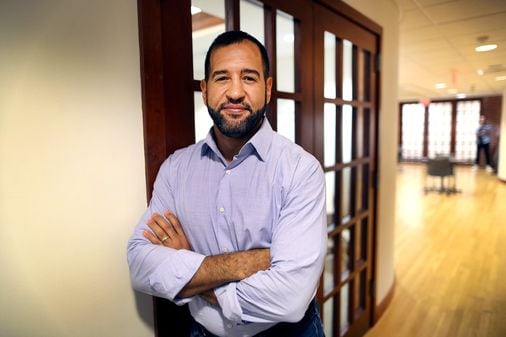Ian Cain, the first openly gay, Black city council president in Quincy’s history and the cofounder of a startup incubator in the city, is weighing a potential challenge as a Republican to US Senator Elizabeth Warren, according to four people aware of his thinking.
Cain, 41, would be the second Warren challenger to emerge from the cryptocurrency world. Attorney John Deaton launched his own bid last month after moving to Massachusetts less than a month prior. He, too, is running as a Republican.
Cain has been gauging a possible run in phone calls, including with people in Republican circles, in recent days. He is a newcomer to the party, having registered as a Republican just last week, on Feb. 29, according to the Quincy election department. He spent the previous four-plus years as an unenrolled voter, and before that, was a registered Democrat for about three years.
It was not clear how close Cain was to making a decision about a campaign. He did not respond to multiple requests for comment Thursday.
In an interview last year with CommonWealth Beacon, Cain suggested he could fit in the pragmatic mold of Charlie Baker, the state’s former, two-term moderate Republican governor.
While he was unenrolled at the time, Cain said if he had to pick a party, “I would probably end up finding opportunity to grow a place in the Republican Party in Massachusetts,” saying he had a pro-business stance and pointing to the success of both Baker and the late Paul Cellucci.
“I try to take the moderate approach,” Cain told CommonWealth Beacon. “I’m not interested in identity politics.”
He’s been a donor mostly to Democratic candidates on the state and federal level, including giving $250 to Joseph P. Kennedy III’s 2016 congressional campaign and $250 to US Representative Stephen Lynch’s 2010 campaign. Cain interned for Lynch in 2001 and 2002, first in the South Boston Democrat’s state Senate office and later when Lynch was elected to Congress.
In 2018, Cain donated $250 to the Massachusetts Democratic Party, and gave the maximum $1,000 donation to former Newton Mayor Setti Warren during his run for governor. He also gave $200 apiece to Lieutenant Governor Kim Driscoll and Attorney General Andrea Campbell during their 2022 campaigns.
Cain is a fourth-generation Quincy resident, whose family first moved to the city from Ireland, according to his city council campaign website. He attended Wollaston Elementary and Central Middle Schools in Quincy, and has degrees from Boston College and Duke University.
Cain has served on the City Council since 2016. He cofounded a startup incubator two years ago called QUBIC Labs, telling the Globe in 2022 that he believed he could build a blockchain ecosystem that will bring jobs and a culture of innovation to his hometown.
“Blockchain just isn’t about crypto,” he told the Globe, calling it a “fundamental, disruptive technology.”
He said he wanted the blockchain community to feel welcome in Quincy, similar to how Miami Mayor Francis Suarez lured crypto companies and venture capitalists to his city during the pandemic.
“There was a circumstantial opportunity that the mayor of Miami took full advantage of, in trying to convene the energy,” Cain told the Globe then. “We’re also seizing an opportunity, because I don’t see Boston moving on this.”
Warren, a progressive Democrat who’s seeking a third term, is one of Washington’s most vocal advocates for increased regulation of cryptocurrency.
Cain has not been publicly critical of Warren. In 2016, he posted a photo of himself and Warren on Facebook from an event at Suffolk Law School.
Whispers of Cain’s political ambitions have surfaced before. Last fall, a text message poll circulated to voters in Lynch’s district, which includes Quincy, pitting Cain against the incumbent. Cain denied he was behind it, according to CommonWealth Beacon.
Republicans, hopeful that the right candidate could topple Warren, have argued the Cambridge Democrat is not popular or present enough in the state. A survey last year from the MassINC Polling Group found that just 41 percent of Massachusetts residents view Warren favorably. That said, Warren soundly defeated Republican challenger Geoff Diehl in 2018 by 25 percentage points.
When she ran for president in 2020, Warren finished third in the Democratic primary in Massachusetts behind Joe Biden and Vermont Senator Bernie Sanders.
Since Deaton emerged as a challenger, a spokesperson Warren has said that she is “taking nothing for granted” and “has a strong record of delivering for working families and continues to fight hard for the people of Massachusetts.”
Samantha J. Gross can be reached at [email protected]. Follow her @samanthajgross. Matt Stout can be reached at [email protected]. Follow him @mattpstout.

